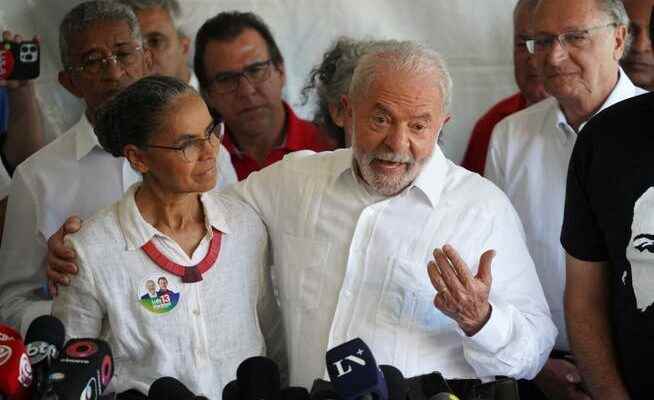After the narrow election victory, the Brazilian ex-president Lula quickly regained his old strength. President Bolsonaro, on the other hand, does not comment on the defeat.
The election victory seems to have revitalized Lula.
When Luiz Inácio Lula da Silva climbed onto the truck with the huge loudspeakers on Avenida Paulista late on Sunday evening after his narrow election victory, many of the assembled supporters wondered: Will the 77-year-old be able to speak at all after the nerve-wracking election campaign of the past few months ? Isn’t he tired?
The hours before, Brazil had experienced an election thriller. Lula narrowly won against incumbent Jair Bolsonaro on the final straight of the counts with around two million votes. He won 50.9 percent of the votes. This makes Lula the first president of Brazil since the end of the dictatorship in 1985 to hold office for the third time.
But the election victory seems to have revitalized Lula. There is not much sign of tiredness on election night. Lula delivers a flaming speech for almost an hour. With his roaring voice, he thanks his comrades-in-arms, including those from the conservative camp, whom he has been able to win over to his alliance in recent weeks.
Brazil should no longer be an international pariah
But he does address many issues that have barely been an issue in Brazil over the past four years, with right-wing populist Bolsonaro as president. Poverty alleviation and education would be the top priorities of his government. He mentions a new industrial policy, his concerns about the environment and the Amazon. He wants to reintegrate Brazil into the world economy and geopolitics. Brazil shouldn’t continue to be the global pariah.
With Lula as President, Brazil’s foreign policy isolation in the West will probably soon be over. Bolsonaro has become persona non grata in Europe and the US because of his controversial environmental policies, his admiration for Trump, Putin and other populists, and his personal insults to heads of state like Macron from France.
Lula, on the other hand, wants to revive the once good relations with Europe. He will want to play in the top league again when it comes to climate policy and environmental protection, but also other issues of world politics and globalization – just like he did during his reign from 2003 to 2010. It helps that his political reputation abroad is significantly better than in Brazil itself.
Lula faces a tough third term starting January 1, 2023. Because Brazil experienced a shift to the right in its politics in the first ballot. Congress and most of Brazil’s 27 states are dominated by conservative politicians. The evangelicals, farmers and family entrepreneurs as well as the military and police are the strongest pillars of this right-wing power bloc.
Lula, on the other hand, has less than a third of the votes in Congress on his side, by calculation. In addition, around half of Brazilians reject the former union leader because of his involvement in corruption.
Financial markets remain calm after Lula’s election
In this way, Lula will be able to end Brazil’s foreign policy isolation comparatively quickly. However, it becomes more difficult with environmental and Amazon policy: There, the president has to rebuild the institutions that were shattered under Bolsonaro, hire massive staff and pass laws. To do this, he needs majorities in Congress. It will come to his aid that Brazilian politicians, regardless of their ideology, seek closeness to the government.
Lula has yet to announce an economic program or staffing decisions for key positions in his cabinet. In São Paulo it is expected that he will soon announce the cornerstones of his program and, above all, the names of his finance and economics ministers. The day after the election, the financial markets remained surprisingly calm. The Real and the stock market index remained stable. Previously, investors had always warned that if Lula won, markets would react nervously.
Fears that Bolsonaro supporters are attempting to cause public chaos that could then lead to a military-backed coup – all speculations that Bolsonaro and his supporters have pondered publicly time and time again – have also evaporated.
Even the day after the elections nothing was heard from President Bolsonaro. He did not even comment on the defeat on social networks, nor did he thank his supporters for the 58 million votes. In some agriculturally dominated regions, truck drivers and farmers erected road barricades, which were quickly dismantled.
What is decisive for the political calm after the elections is that the heads of the judiciary, the Senate and the House of Representatives accepted the election results immediately after they were officially announced. Arthur Lira, President of the House of Representatives and President Bolsonaro’s ally, declared that the elections were clean and flawless. Any challenge to the result would not be accepted by Congress. Only the military, a close ally of Bolsonaro, did not comment on the election result.
For a long time, Lula seemed to have lost the bite he once had in the current election campaign. But the last few weeks have revitalized him significantly. Many in Brazil are now hoping that, in order to be able to govern, he could widen his coalition to the right to fill the vacant seat at the political center. In view of the increasing polarization, Brazil could urgently need a reconciler.
